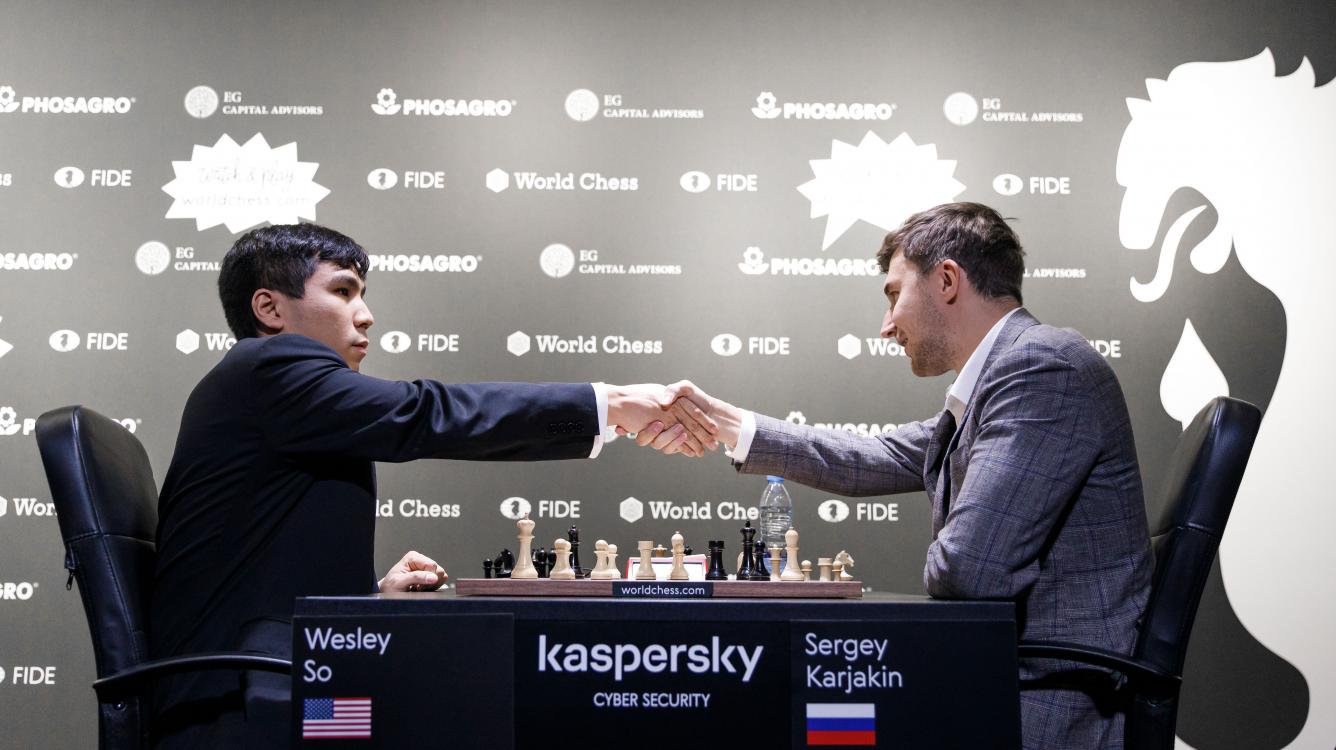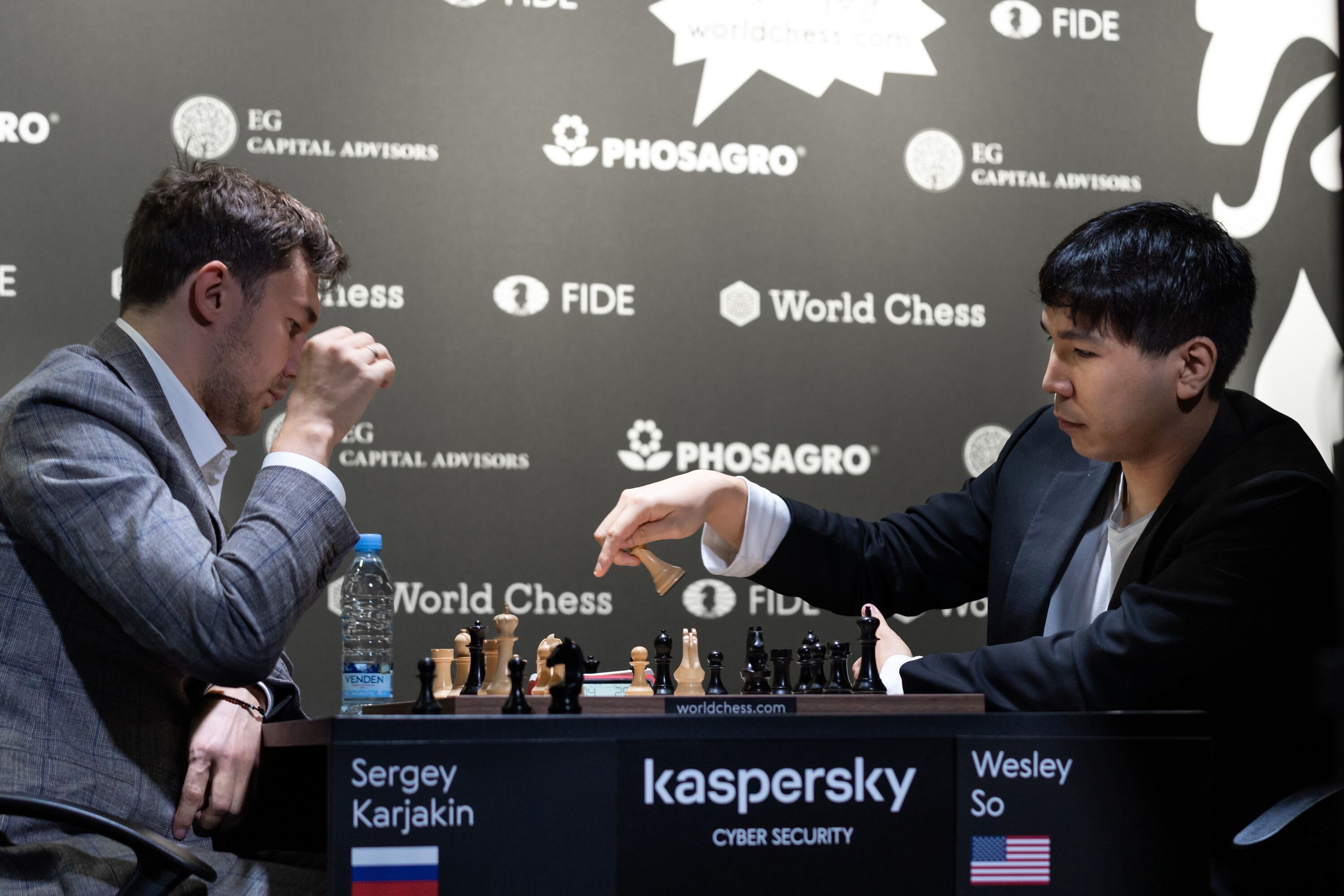
Riga Grand Prix Round 2 Tiebreaks: Grischuk, Mamedyarov, So Reach Semis
While Maxime Vachier-Lagrave had qualified after the two classical games, Alexander Grischuk, Wesley So and Shakhriyar Mamedyarov also reached the semi-finals of the Riga Grand Prix after yesterday's tiebreaks.
Day six in Riga was an exciting affair with the round two tiebreaks. Unlike in round one, none of the matches went all the way to the Armageddon game to force a decision.
The match between So and Sergey Karjakin was the longest of the round, where the former went through and can consider himself extremely lucky.

After two draws in the classical and four more in the tiebreaks, So won the first blitz game. His English opening was dubious, and he had to give give up his queen for two minor pieces and pawn. Karjakin looked better throughout until a late blunder eventually cost him the game and the match.

In the last blitz game, Karjakin had a chance to take the match into his second Armageddon in as many matches. He later admitted that he played 1.b3 to avoid the main lines and try for something.
The opening backfired massively and So was winning in several ways. But, just before the end, the American blundered but Karjakin just couldn't put the ball in the back of the net.

Karjakin later expressed: "I feel a bit of pity because for the first time in the tournament I played very precisely in the opening [in the first game given above] and remembered all the moves 9...Bg4 and 10...e4 but finally I lost!"
So: "It has been a super tough match for me and even my win with the white pieces was unexpected. It's been a great match and I learned a lot."
Grischuk and Yangyi Yu had started with two fairly interesting draws in their classical games. The Russian didn't waste any time and brought a home cooked novelty for his first rapid game. Grischuk's impressive technique and fine management of his pieces made sure this was our game of the day.


This put Grischuk in the driver's seat. Yu played a simple opening and tried to put Grischuk under pressure. Grischuk later admitted that he himself had played the same variation as white and had drawn as many as 10 games, so he knew all the important things about the line and that it wasn't very dangerous. He held the return game and sent the Chinese packing.

Yu said: "In the second game I really tried to win but my opponent played okay and yeah, congratulations to my opponent."
When asked about his performance, Grischuk didn't hold back: "I cannot judge my performance when it's still ongoing." He repeated his remark from Moscow that there should be a rest day after two rounds and not after three rounds.
"It is the same thing in the World Cup and I will keep saying it every time. It is also logical to have six days working week and one rest day and I don't know where people have a nine days working week."
Shakhriyar Mamedyarov advanced to the semifinals of #GrandPrixFIDE in Riga after winning the second rapid game vs Jan-Krzysztof Duda.
— International Chess Federation (@FIDE_chess) July 17, 2019
The first move in their tiebreak was made by famous Latvian #football player Māris Verpakovskis.
📷 by Nick Dunaevsky #worldchess #chess pic.twitter.com/4qJyrQR4Km
Mamedyarov is through to the semi-finals at the expense of Jan-Krzysztof Duda. Azerbaijan's number one did it the hard way as he drew with white and won with black. But, Mamedyarov thoroughly deserved it as he never worse throughout and should have won game one of the rapid as well.
An exciting first game in the rapid got to the players and especially Duda. As White, he chose a razor sharp line and launched a kingside attack as early as move eight with 8.Rg1 followed by 9.g4. The stars aligned perfectly for Mamedyarov, who loves positions like these. He played logical chess and took his chances to seal his semi-final berth.

Defending his strategy to play like Mamedyarov himself, Duda explained: "It is also a risk not to risk at all. I was taking too much time for every move and couldn't come up with any constructive plan and then my position became very worse and I started making random moves."
Mamedyarov admitted: "For me it's very easy to play this as every time I play this idea with Rg1-g4 and try to attack but this was the first time I played as Black."
Speaking on the difference, he said: "I never play moves like a3, Qc2 but I just go h4-h5. This time it was very easy for me to play as Black."
Semifinals of FIDE Grand Prix in Riga:
— International Chess Federation (@FIDE_chess) July 17, 2019
🇺🇸 Wesley So vs Shakhriyar Mamedyarov 🇦🇿
🇷🇺 Alexander Grischuk vs Maxime Vachier-Lagrave 🇫🇷
Who do you think will meet in the final? #GrandPrixFIDE #FIDE #worldchess #RigaPlaysChess@Vachier_Lagrave @Shakhmamedyarov @theworldchess pic.twitter.com/MeJSHdWUbB
2019 FIDE Grand Prix series consists of four knockout tournaments, each with 16 players who play two classical games per round and, if needed, a tiebreak on the third day. Ian Nepomniachtchi won the first Grand Prix tournament in Moscow. The remaining two are Hamburg, Germany (November 4–18) and Tel Aviv, Israel (December 10–24).
Each of the four tournaments has a prize fund of 130,000 euros ($145,510). Prizes for the overall standings in the series total 280,000 euros ($313,405), making the total prize fund of the series 800,000 euros ($895,444).
The games start each day at noon UTC. You can follow the games here as part of our live portal. The official site is here.
The official World Chess broadcast with GMs Evgeny Miroshnichenko and Arturs Neiksans.
Previous reports:

